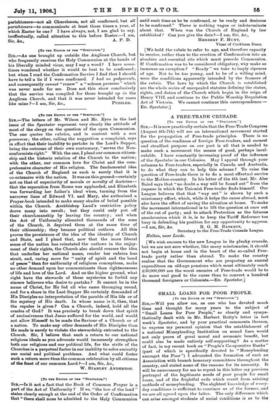(To WI EDITOR 01 THE "SPROTATOR:1 SIR,—The letters of Mr.
Wilson and Mr. Eyre in the last issue of the Spectator represent very clearly the attitude of most of the clergy on the question of the open Communion. The one quotes the rubrics, and is content with a non, possumus ; the other, calling the suggestion a complaint, says in effect that their inability to partake in the Lord's Supper, being the outcome of their own contumacy, "serves the Non- conformists right." With the one, I plead our common citizen- ship and the historic relation of the Church to the nation; with the other, our common love for Christ and the com- prehensive character of His religion. The fundamental idea of the Church of England as such is surely that it is co-extensive with the nation. It was on this ground—certainly not on that of superiority of morals or novelty of doctrine— that the separation from Rome was applauded, and Elizabeth was forwarding her father's ideal when, turning from the narrower lines of Edward VI. and Mary, she authorised a Prayer-book intended to make many shades of belief possible within the Church. Archbishop Land's restrictive policy drove many into revolt ; but they could only put off their churchmanship by leaving the country; and when the Act of Uniformity alienated thousands of the sons of the Church, it deprived them at the same time of their citizenship; they became political outlaws. All this proves the persistence of the idea of the identity of Church and State, and I plead that, now that the more liberal sense of the nation has reinstated the outlaws in the enjoy- ment of their rights, the Church also should resume the idea that underlies her national name, render her rubrics less strait, and, caring more for "unity of spirit and the bond of peace " than for uniformity of religious conceptions, make no other demand upon her communicants than righteousness of life and love of the Lord. And on the higher ground, what right have the stewards of these mysteries to forbid any sincere believers who desire to partake ? It cannot be in the name of Christ, for He fed all who came thronging round, and for a share in the Last Supper He certainly demanded of His Disciples no interpretation of the parable of His life or of the mystery of His death. In whose name is it, then, that the repulse is given ? Can a Church, indeed, hold all the oracles of God ? It was precisely to break down that spirit of exclusiveness that Jesus suffered for the world, and would not allow Himself to be made the Saviour of a Church or of a nation. To make any other demands of His Disciples than He made is surely to violate the stewardship entrusted to the Church. Sir, I believe that such a return to our national religions ideals as you advocate would immensely strengthen both our religions and our political life, for the strife of the Churches is a perpetual factor in our inability to solve amicably our social and political problems. And what could foster such a return more than the common celebration by all citizens of the feast of our common Lord P—I am, Sir, &c.,
W. STANLEY ANDEETON.






































 Previous page
Previous page